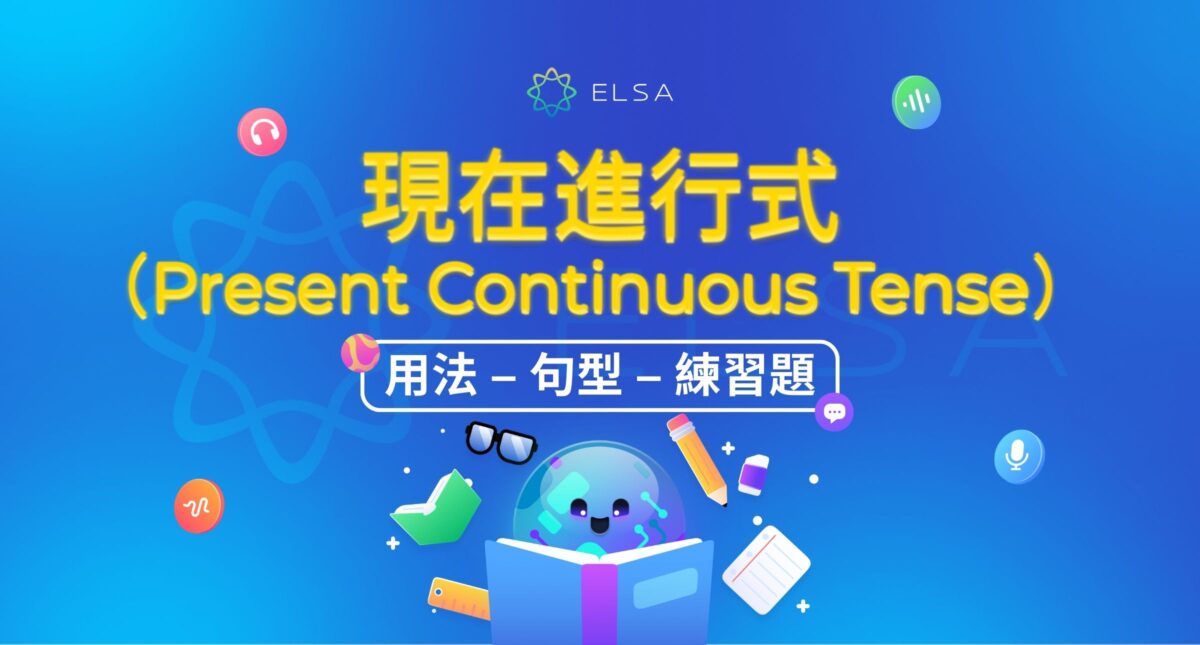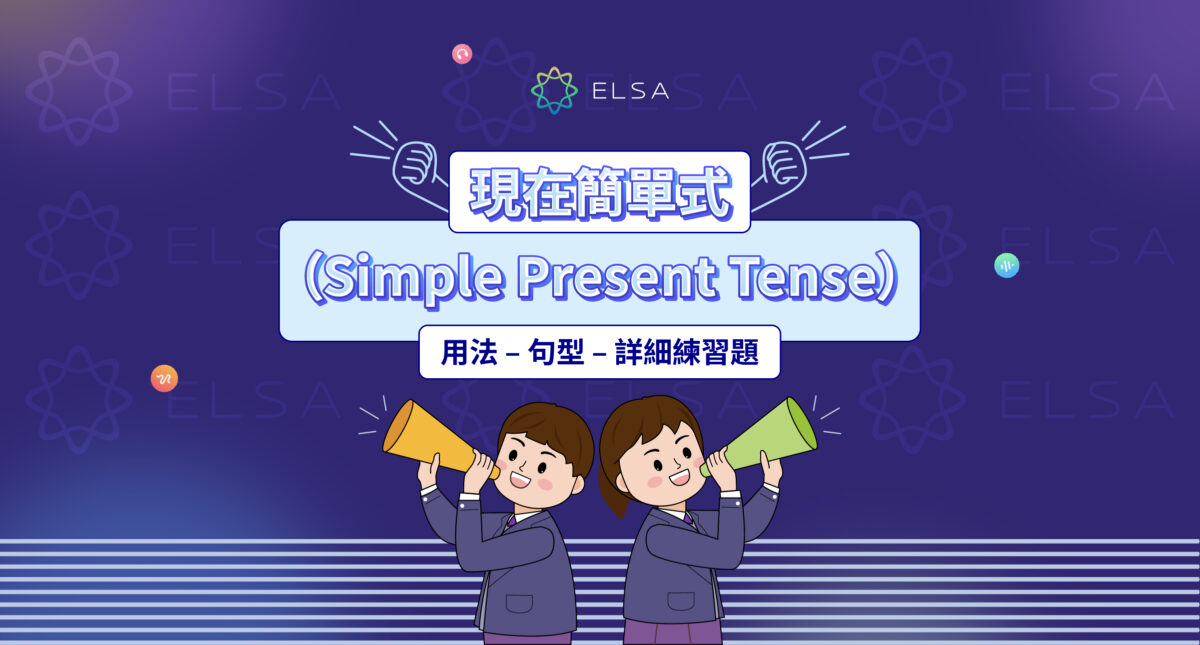很多學員在英語考試中最難的練習之一就是改寫句子,尤其是被動語態英文。一起跟 ELSA Speak,參考總結被動語態知識如:被動語態公式、被動語態用法、被動語態例句,在英語中複習並牢牢掌握這個知識點!
被動語態是什麽?
被動語態意思是:用來表示對「承受」某動作的人或物的關注,而不是關注「執行」某動作的人或物。
- 主動句 (active voice): 主語是執行動作的主要對象(影響動詞)— 誰做什麼?
- 被動句 (passive voice): 動作影響主語/主語受動詞影響 – 誰被/可以做什麼?
被動語態用法
用於強調受另一個動作影響的對象,而不是執行該動作的主體
例如: My father punished my brother for playing video games all the night – 我爸爸因為我弟弟整晚玩電子遊戲而懲罰他。
=> My brother was punished by my father for playing video games all night – 我弟弟因為玩了一晚上而被父親懲罰。
當不知道誰/什麼執行了該操作或某事並不重要時
例如: Someone stole my wallet
=> My wallet was stolen (我的錢包被偷了) – 在這種情況下,我們不說 “Someone stole my wallet” 而我们想强调主體是 “wallet”
被動語態公式
被動語態基本結構

| 主動句: S1 + V + O |
| 被動句: S2 + to be + V3/-ed |
其中,動詞 “to be” 的被動語態 (passive voice) 根據主動句的時態進行變位,保證主謂和諧的原則。
例如: Annie gives John a lovely gift.
=> John is given a lovely gift by Annie.
情況動詞有2個賓語,如果您想強調哪個賓語,就把那個賓語作為主語。但是,被動語態的主語通常是間接賓語。
>>更多内容:
句子中的主語是 they, people, everyone, someone, anyone
如果S——主動語態中的主語是:they,people,everyone,someone,anyone,…那麼就不需要把它放在被動語態中(應用上面提到的被動語態的第二種用法)。
例如:
- Someone stole my bike last night – 他們昨晚偷了我的自行車。
=> My bike was stolen last night – 昨晚我的自行車被偷了。
- They have finished that exercise since last week – 他們上周完成了這個作業。
=> That exercise has been finished since last week – 這個作業已于上周完成。
主語是人或事物
直接引起動作,轉換爲被動語態則用 “by”
例如: Lisa is making a cake – Lisa 正在做蛋糕。
=> A cake is being made by Lisa – 蛋糕正由 Lisa 做。
間接引起動作則用 “with”
例如: I open the door with a key – 我用鑰匙打開了門。
=> The door is opened with a key – 門是用鑰匙打開的。

轉換主動語態成被動語態的方法
將主動語態轉換為被動語態,您按照下列步驟操作:
- 第一步:確定主動語態中的賓語,用作被動語態中的主語。
- 第二步:確定主動語態中的時態,將動詞改為被動形式。
- 第三步:將主動句語態的主語改為賓語,並在前面添加 “by” 或 “with”。上面提到的不定對象可以省略。

例如: She sent his relative a letter.
- 第一步:確定主動語態中的賓語,用作被動語態中的主語。
主動語態中的賓語是 “his relative” (他的親戚)。
- 第二步:確定主動語態中的時態,將動詞改為被動形式。
主動語態是過去簡單式 (“sent”). 動詞 “sent” 動詞變位是 “was sent” (被寄) 在過去簡單式。
- 第三步:將主動句語態的主語改為賓語,並在前面添加 “by” 或 “with”。上面提到的不定對象可以省略。
主動語態中的主語是 “she”。但在被動語態中,“she” 在執行動作中並不起重要作用,因此可以省略或用 “by” 代替,以表示執行動作的施事者。
=> A letter was sent to her relative (by her) – 一封信已被寄給她的親戚 (由她).
英語時態的被動語態結構
例如:
- She reads a book every week – 她每周讀一本書。
=> A book is read by her every week – 一本書每周由她讀。
- They had built the house for ages – 他們很久以前就建了房子。
=> The house had been built by them for ages – 這房子由他們很久以前建的。
以下是被動語態文法:

現在是的被動語態結構
現在簡單式
| 主動句: S + V + O |
| 被動句: O + am/is/are + V3/ed + (by + S) |
例如:
- I buy a pen – 我買了一支筆。
=> A pen is bought (by me) –一支筆被買 (由我)。
- She eat an apple – 她吃了一個蘋果。
=> An apple is eaten (by her) – 一個蘋果被吃 (由她)。
現在進行式
| 主動句: S + am/ is/are + V-ing + O |
| 被動句: O + am/is/are + being + V3/ed + (by + S) |
例如:
- She is wearing a school uniform – 她正穿着校服。
=> A school uniform is worn by her – 校服正由她穿。
- My brother is writing an essay – 我弟弟正在寫一篇論文。
=> An essay is written by my brother – 一篇論文正由我弟弟寫。
現在完成式
| 主動句: S + have/has + V3 + O |
| 被動句: O + have/has + been + V3/ed + (by + S) |
例如:
- My mom has made this lunch box for me – 媽媽給我做了這個飯盒。
=> This lunch box has been made for me by my mom – 這個飯盒是由我媽媽給我做的。
- My best friend has sent me a gift on my birthday best friend – 我最好的朋友在我生日那天送了我一份禮物。
=> I have been sent a gift on my birthday by my best friend./ A gift has been sent to me on my birthday by my best friend.
大致翻譯: 我的禮物在我生日的那一天是由我最好的朋友送給我的 / 一份禮物在我生日的那一天已被送給我由我最好的朋友。
現在完成進行
| 主動句: S + have/has been + V-ing + O |
| 被動句: O + have/has been + being + V3/ed + (by + S) |
例如:
- They had been baking for two hours – 他們已烤蛋糕兩個小時了。
=> The cake has been baking for 2 hours – 蛋糕已被烤了兩個小時了。
- They have been repairing the car for two hours – 他們用了兩個小時就把車修好了。
=> The car has been being repaired for two hours – 輛車已在兩個小時后修好了。
過去式的被動語態結構
過去簡單式
| 主動句: S + V2 + O |
| 被動句: O + was/were + V3/ed + (by + S) |
例如:
- I ate a hamburger for lunch – 我午餐吃了一個漢堡。
=> A hamburger was eaten for lunch by me – 一個漢堡在午餐由我吃了。
- She didn’t tell you the truth – 她沒有告訴你真相。
=> The truth wasn’t told to you by her – 真相沒由她告訴。
過去進行式
| 主動句: S + was/were + V-ing + O |
| 被動句: O + was/were + being + V3/ed + (by + S) |
例如:
- I was doing my homework at that time – 當時我正在做作業。
=> My homework was being done by me at that time – 當時作業正在由我作。
- Students were planting trees – 學生們正在種樹。
=> Trees were being planted by students – 樹正在由學生們種。
過去完成式
| 主動句: S + had + V3 + O |
| 被動句: O + had + been + V3/ed + (by + S) |
例如:
- A poor man in that town had won a lottery – 那個鎮上的一個窮人中了彩票。
=> A lottery had been won by a poor man in that town – 彩票由那個鎮上的一個窮人中。
- She found a lost cat on the street – 她在街上找到了一只走失的猫。
=> A lost cat had been found by her on the street – 一只走失的猫由她在街上找到。
過去完成進行式
| 主動句: S + had been + V-ing + O |
| 被動句: O + had been + being + V3/ed + (by + S) |
例如:
- They had been revising the program for three weeks before it was approved – 他們在通過之前對該計劃進行了三周的修改。
=> The program had been being revised for three weeks before it was approved – 該計劃在通過前的三周內進行了修改。
- The chef had been preparing the meal for two hours – 廚師用了兩個小時準備好了飯菜。
=> The meal had been being prepared by the chef for two hours – 飯菜是廚師在兩個小時內準備好的。
未來式的被動語態結構
未來簡單式
| 主動句: S + will + V1 + O |
| 被動句: O + will + be + V3/ed + (by + S) |
例如:
- Our boss will hold a meeting tomorrow – 我們的老闆明天召開會議。
=> A meeting will be held by our boss tomorrow – 一個會議由我們的老闆明天召開
- The businessman will buy that expensive car soon – 商人很快就會買那輛昂貴的汽車。
=> That expensive car will be bought by the businessman soon – 昂貴的汽車會被買由商人。
Be going to
| 主動句: S + is/ am/ are + going to + V |
| 被動句: O + is/am/are + going to be + V3/ed + (by S) |
例如:
- Lisa is going to visit her friend’s house next weekend – Lisa 下周末將去看望她朋友家。
=> Lisa’s friend’s house is going to be visited by her next weekend – Lisa 朋友家將在下周末由 Lisa 去看望.
- I am going to visit my grandparents next weekend – 下周末我會去看望我的祖父母。
=> My grandparents are going to be visited by me next weekend – 我的祖父母在下周末會由我去看望。
未來進行式
| 主動句: S + will be + V-ing + O |
| 被動句: O + will be + being + V3/ed + (by + S) |
例如:
- He’ll be taking over this store tomorrow morning at 8 a.m – 他將於明天早上八點接管這家店。
=> This store will being taken over by him at 8 o’clock tomorrow morning – 這家店明天早上八點就被他接手了。
- This time next month, people will be planting 20 new trees in our area –下個月的這個時候,人們將在我們地區種植 20 棵新樹。
=> This time next month, 20 new trees will be being planted in our area – 下個月的這個時候,20 棵新樹將在我們地區由人們種植。
未來完成
| 主動句: S + will be + V-ing + O |
| 被動句: O + will be + being + V3/ed + (by + S) |
例如:
- At this time tomorrow, we will have finished the mid-term test – 明天這個時候,我們期中考試就結束了。
=> At this time tomorrow, the mid-term test will have been finished by us – 到明天這個時候,期中考試我們就已經完成了。
- We’re late already. When we get there, people will have bought all the books – 我們已經遲到了。當我們到達那裡時,每個人都會買完所有的書。
=> We’re late already. When we get there, all the books will have been bought – 我們已經遲到了。當我們到達那裡時,所有的書都已經被買完了。
未來完成進行
| 主動句: S + will have been + V-ing + O |
| 被動句: O + will have been + being + V3/ed + (by + S) |
例如:
- They will have been building the bridge for a year by next month –他們將於下個月在一年內建成這座橋。
=> The bridge will have been being built for a year by next month – 這座橋將於下個月建成。
- They will have been demolishing the building for a month by next week – 下周他們將在一個月內拆除這座大樓。
=> The building will have been being demolish for a month by next week – 下周這座大樓在一個月內將與拆除。
閲讀更多:
- 過去完成式 (Past Perfect): 理論與練習
- 不定代名詞 (Indefinite pronouns): 用法和題庫
- Used to, be used to, get used to 的構造在英文中的用法是什麼?區別和練習示例以避免混淆
被動語態的特殊形式
兩個賓語的被動語態
| 主動句: S + V + O1 + O2 |
被動句:
- 情況一:將主動句中的間接賓語作為被動句中的主語。
| 公式: S + Be + Vp.p + O1 |
- 情況二:將主動句中的直接賓語作為被動句中的主語。
| 公式: S + Be + Vp.p + 介詞 + O2 |
| 例如 (主動句) | 情況一 | 情況二 |
| My dad gave me a new watch on my 18th birthday. 大致翻譯:我父親在我 18 歲生日時送給我一塊新手錶。 | I was given a new watch on my 18th birthday by my dad. 大致翻譯:在我18歲生日那天,我收到了一塊爸爸送的新手錶。 | A new watch was given to me on my 18th birthday by my dad. 大致翻譯:這塊新手錶在我 18 嵗生日是由父親送給我的。 |
| Tommy bought his wife a trench coat yesterday. 大致翻譯:Tommy 昨天給他妻子買了一件漂亮的長外套。 | Tommy’s wife was bought a beautiful trench coat yesterday. 大致翻譯:昨天 Tommy 的妻子收到了買給她的一件漂亮的長外套。 | A beautiful trench coat was bought for Tommy’s wife yesterday. 大致翻譯:昨天一件漂亮的長外套被買給湯米的妻子。 |
主動語態是 Yes/No 問題
| 主動句 | 被動句 |
| Do/does + S + V (bare) + O …? | Am/is/are + S’ + V3/-ed + (by O)? |
| Did + S + V (bare) + O …? | Was/were + S’ + V3/-ed + by + …? |
| Modal verbs + S + V (bare) + O + …? | Modal verbs + S’ + be + V3/-ed + by + O’? |
| Have/has/had + S + V3/-ed + O + …? | Have/has/had + S’ + been + V3/-ed + by + O’? |
例如: Do you finish your homework? – 你做完作業了嗎?
=> Is your homework finished? – 你的作業做完了嗎?
主動句與 V + Ving
| 主動句: V + somebody + V-ing |
| 被動句 : V +somebody/something + being + V(P2) |
該句型與動詞一起使用,比如: hate, love, like, dislike, admit, deny, regret, enjoy…
例如:
- John loves trying new things – John 喜歡嘗試新事物。
=> John loves new things being tried – John喜歡新的事物被嘗試。
- I regret not eating a lot of vegetables – 我後悔沒有多吃蔬菜。
=> I regret a lot of vegetables not being eaten – 我很後悔很多蔬菜沒有被吃。
被動語態與感性動詞
對於包含表示人類感性動詞的主動形式,比如: hear (聼), see (看), watch (看), look (看), notice (感覺到)… 那被動語態分為以下兩種:
- 當某人目睹另一個人正在做的事情但只看到該動作的一部分或正在發生的動作被另一個動作打斷時。
| 主動句 | 被動句 | |
| 公式 | S + V2/ed + Sb + V-ing | S + was/were + V3/-ed + V-ing |
| 例如 | She watched them playing tennis. 大致翻譯: 她看着他們打網球。 My sister saw me leaving the house early today. 大致翻譯: 我姐姐看到我今天早上很早就出門了。 | They were watched playing tennis. 大致翻譯: 他們被觀看打網球。 I was seen leaving the house early by my sister today. 大致翻譯: 我今天早上出門被我姐姐看到了。 |
- 當一個人從頭到尾目睹另一個人的行為時。
| 主動句 | 被動句 | |
| 公式 | S + V2/ed + Sb + V | S + was/were + V3/-ed + to V |
| 例如 | I heard her scream 大致翻譯: 我聽到她的尖叫聲。 I hear someone singing my favorite song. 大致翻譯: 我聽到某人唱我最喜歡的歌。 | She was heard to scream 大致翻譯: 她被聽到在尖叫。 Someone is heard singing my favorite song. 大致翻譯: 某人被聽到唱我的最愛歌曲。 |
祈使句的被動形式
情況一: V + O + …
| 主動句 | 被動句 | |
| 肯定 | V + O + … | Let O + be + V3/-ed |
| 否定 | Do not + V + O | Let + O + not + be + V3/-ed |
例如:
| 主動句 | 被動句 | |
| 肯定 | Put your hand down. 大致翻譯: 手放下。 Turn down the radio. 大致翻譯: 調低收音機! | Let your hand be put down. 大致翻譯: 讓你的手放下。 Let the radio be turned off! 大致翻譯: 讓收音機調低! |
| 否定 | Do not take that dress. 大致翻譯: 不要拿那件衣服。 Do not touch the paintings. 大致翻譯: 不要碰圖片。 | Let that dress not be taken. 大致翻譯: 讓那件衣服不要被拿走。 Let the paintings not be touched 大致翻譯: 讓畫作不要被碰。 |
It’s one’s duty to + V-inf
| 主動句: It’s one’s duty to + V-inf |
| 被動句: S + to be + supposed to+V inf |
例如:
- It’s your duty hang the clothes everyday – 每天晒衣服是你的職責。
=> You’re supposed to hang the clothes everyday – 你需要每天晒衣服。
- It’s students’ duty to finish their homework – 完成家庭作業是學生的責任。
=> Students are supposed to finish their homework – 學生需要完成家庭作業。
情況三: It’s necessary to + V-inf
| 主動句: It’s necessary to + V-inf |
| 被動句: S + should/ must + be +P2 |
例如:
- It’s necessary to protect the wild animal – 保護野生動物很重要。
=> The wild animal should be protected – 野生動物需要保護。
- It’s necessary to stop cutting down trees – 停止砍伐樹木是必要的。
=> Cutting down trees must be stopped – 砍伐樹木必須被停止。
命令句的被動形式 (要求某人做某事)
情況一: S + have + somebody + V
| 主動句: S + have + somebody + V |
| 被動句: S + have + something + P2 + by sb |
例如:
- I have my older brother fix my computer – 我請哥哥修理我的電腦。
=> I have my computer fixed by my older brother – 我讓我的電腦被哥哥修理。
- She had her friend submit her essay – 她請她的朋友提交論文。
=> She had her essay submitted by her friend – 她讓她的論文被她的朋友提交。
情況二: S + get + somebody + to-V
| 主動句: S + get + somebody + to-V |
| 被動句: S + get + something + P2 |
例如:
- My mother got me to sweep the floor – 我媽媽請我掃地板。
=> My mother got the floor swept by me – 我媽媽讓地板被我掃.
- My father gets me to pick my younger brother up after school everyday –我爸爸請我每天放學後接弟弟。
=> My father gets my younger brother picked up after school by me everyday – 我爸爸讓弟弟在放學後由我接。
雙被動語態
當主要動詞 (V1) 為現在簡單式、現在進行式和現在完成式
| 方法一 | 公式 | 例如 |
| 主動句 | S1 + V1 + that + S2 + V2 + O | People believe that the government should do something to help the poor. 大致翻譯:人們相信政府需要做些什麼來幫助窮人。 |
| 被動句 | It is + V1(p2) + that + S2 + V2 + O | It is believed that the government should do something to help the poor. 大致翻譯:有人認為政府應該做些什麼來幫助窮人。 |
| 方法二 | 主動句 | 被動句 |
| 情況一:當 V2 處於現在簡單式或未來簡單式時 | S1 + V1 + that + S2 + V2 + O | S2 + am/is/are + V1(p2) + to + V2(inf) + O |
| 情況二:當 V2 是過去簡單式或現在完成式 | S1 + V1 + that + S2 + V2 + O | S2 + am/is/are + V1(p2) + to have V2(p2) + O |
例如:
| 主動句 | 被動句 | |
| 情況一 | Someone says that the little boy will become a talented footballer in the future. 大致翻譯:有人說那個小男孩將來會成為一名有才華的足球運動員。 | The little boy is said to become a talented footballer in the future. 大致翻譯:那個小男孩被認為將來會成為一名有才華的足球運動員。 |
| 情況二 | Our neighbors say that that young man has stolen the motorbike. 大致翻譯:我們的鄰居說那個年輕人偷了摩托車。 | That young man is said to have stolen the motorbike. 大致翻譯:那個年輕人被認為偷了摩托車。 |
當主要動詞 (V1) 為簡單過去式、過去進行式、過去完成式
| 方法一 | 公式 | 例如 |
| 主動句 | S1 + V1 + that + S2 + V2 + O | People told that someone has stolen the painting. 大致翻譯:大家說有人偷了那幅畫。 |
| 被動句 | It was + V1(p2) + that + S2 + V2 + O | It is told that someone has stolen the painting. 大致翻譯:有人說那幅畫被偷了。 |
| 方法二 | 主動句 | 被動句 |
| 情況一:當 V2 是過去簡單式 | S1 + V1 + that + S2 + V2 + O | S2 + was/were + V1(p2) + to + V2(原型) + O |
| 情況二:當 V2 是過去完成式 | S1 + V1 + that + S2 + V2 + O | S2 + was/were + V1(p2) + to have V2(p2) + O |
例如:
| 主動句 | 被動句 |
| Students said that food at the school canteen was good. 大致翻譯:學生們說學校食堂的食物很好吃。 | Food at the school canteen was said to be good by students. 大致翻譯:學校食堂的食物被學生們說是很好吃的。 |
| People in the town said that the President had visited their town silently. 大致翻譯:鎮上的人們說總統悄悄訪問了他們的鎮。 | The President was said to have visited their town silently. 大致翻譯:總統被認為悄悄訪問了他們的鎮。 |
被動句與 Make 和 Let/Allow
被動句與 Make
| 主動句: S + make + sb + V-inf + O |
| 被動句: Sb + to be + made + to + V-inf + O |
例如:
- My teammates make me do the presentation on my own – 我的組員要求我自己做演講。
=> I am made to do the presentation on my own by my teammates – 我被組員要求自己做演講。
- They make me cook for everyone at the party alone – 他們讓我一個人為派對給大家做飯。
=> I am made to cook for everyone at the party alone – 我被要求一個人為派對給大家做飯。
被動句與 Let/Allow
| 主動句: S + let/allow + Sb + V-inf + O |
| 被動句: Sb + be + let/allowed + to V-inf + O |
例如:
- My parents allow me to go out until 11pm – 我父母允許我外出到晚上11點。
=> I am allowed to go out until 11pm by my parents – 我被父母允許出去到晚上11點。
- My friends let me choose a restaurant for our dinner – 我的朋友們讓我選擇一個餐廳來安排我們的晚餐。
=> I am let to choose a restaurant for our dinner by my friends – 我被朋友們允許選擇一個餐廳來安排我們的晚餐。
被動語態與七個特殊動詞

七個特殊動詞包含:
- Suggest: 提議。
- Recommend: 推薦。
- Order: 命令,要求。
- Request: 請求。
- Require: 要求,需要。
- Demand: 要求。
- Insist: 堅持。
| 主動句: S + suggest/recommend/demand… + that + S + (should) + V-inf + O |
| 被動句: It + be + suggested/recommended/demanded… + that + S + (should) + be + V3/ed + O |
例如:
- The tour guide recommends that we (should) prepare warm clothes – 導遊建議我們準備暖和的衣服。
=> It is recommended that warm clothes (should) be prepared – 被建議準備暖和的衣服。
- They suggest that we (should) visit TAIPEI 101 Observatory in the summer – 他們建議我們在夏天去參觀台北101觀景台。
=>It is suggested that TAIPEI 101 Observatory (should) be visited in the summer – 被建議在夏天去參觀台北101觀景台。
被動句與主語 It
| 主動句: It + be + adj + for sb + to V + to do something |
| 被動句: It + be + adj + for sth + to be V3/ed |
例如:
- It is difficult for old people to learn a new language – 老人學習一門新語言是很困難的。
=> It is difficult for a new league to be learned by old people – 一門新語言被老人學習是困難的。
- It is typical for girls to play with dolls – 小女孩玩玩偶是很正常的。
=> It is typical for dolls to be played by girls – 玩偶被小女孩玩是很正常的。
被動語態與情態動詞
英文情態動詞被動句的結構與其他形式略有不同。
| 主動句: S + modal verb + V0 + O |
| 被動句: S + modal verb + be + V3 (+ by O) |
注意:對於由一些動詞後跟“to V”或“V-ing”形式的助動詞的句子,當以被動語態寫時,這些動詞將進行變位,並為 “to be V3/p.p” 和 “being V3/ PP”
Can/Could
| 主動句: S + Can/Could + V + O |
| 被動句: S + Can/Could + be + V3/V-ed + (by sb) + O |
例如:
- We can’t see the words on the board – 我們看不到黑板上的字。
=> The words on the board can’t be seen by us – 黑板上的字不能被我們看到。
- The football team could have won the championship last month – 足球隊可能在上個月贏得了冠軍。
=> The championship could have been won by the football team last month – 冠軍可能在上個月被足球隊贏得了。
May/Might
| 主動句: S + May/Might + V + O |
| 被動句: S + May/Might + be + V3/V-ed + (by sb) + O |
例如:
- His careless driving may cause an accident – 他的魯莽駕駛可能會造成事故。
=> An accident may be caused by his careless driving – 事故可能會由他的魯莽駕駛造成。
- They might show you the way to solve that problem – 他們會告訴你怎麼解決那個問題。
=> The way to solve that problems might be shown to you by them – 那個問題的解決方法將由他們告訴你。
Should/Ought to
| 主動句: S + Should/Ought to + V + O |
| 被動句: S + Should/Ought to + be + V3/V-ed + (by sb) + O |
例如:
- You should leave a message before leaving – 你應該在離開之前留下一條留言。
=> A message should be left before leaving – 留言應該在離開之前被留下。
- I ought to gain more weight – 我需要增加幾公斤。
=> More weight ought to be gained by me – 幾公斤需要被我增加。
Must/Have to
| 主動句: S + Must/Have to + V + O |
| 被動句: S + Must/Have to + be + V3/V-ed + (by sb) + O |
例如:
- You must wear a helmet when driving a motorcycle – 你騎摩托車時必須戴上頭盔。
=> A helmet must be worn when driving a motorcycle – 頭盔在騎摩托車時需要被戴上。
- The students have to submit the homework before 4pm – 學生們需要在下午4點之前提交作業。
=> The homework has to be submitted by the students before 4pm – 作業需要在下午4點之前被學生們提交。
其他的被動形式
Need/ want/ require/ deserve/be worth
| 主動句: Need/ want/ require/ deserve/be worth + to V/V-ing |
| 被動句: Need/ want/ require/ deserve/be worth to be p.p |
例如:
- You need to cut your hair soon –你應該早點剪頭髮。
=> Your hair needs to be cut – 你的頭髮需要被剪。
=> Your hair needs cutting – 你的頭髮需要被剪。
注意: Need + V-ing 在這情況下,它具有被動意義。
Avoid
| 主動句: S + avoid V-ing |
| 被動句: O + to be + avoided being p.p + (by sb) |
例如:
- He avoids driving on that bumpy road – 他避免在那條坑窪的道路上開車。
=> That bumpy road is avoided being driven on – 那條坑窪的道路被避免開車。
Prevent
| 主動句: S + prevent … from V-ing |
| 被動句: Sb/sth + to be prevent from being p.p + (by sb) |
例如:
- He prevented me from making that mistake again – 他阻止我再犯那個錯誤。
=> I was prevented from making that mistake again by him – 我被他阻止再犯那個錯誤。

轉換被動語態的主意
將賓語代詞傳爲主語代詞
如果主動句中的賓語(受影響的賓語),即賓語代詞,成為被動句中的主語,我們需要將這些單詞轉換為主語代詞,具體:
| 賓語代詞 | 主語 |
| Me | I |
| Us | We |
| You | You |
| Him | He |
| Her | She |
| It | It |
| Them | They |
Ví dụ: He likes Timmy – 他喜歡 Timmy.
=> Timmy is liked by he. (錯)
=> Timmy is liked by him. (對)
動詞 Fill, Cover, Crowd
對於含有 crowd、fill、cover 這三個動詞之一的句子,當句子由主動變為被動時,我們在賓語前面用 “with” 而不是 “by”。
例如: Ginger jam fills the jar – 薑餅被裝滿了瓶子。
=> The jar is filled with ginger jam – 瓶子被填滿了薑餅。
被動語態中“by”、地點和時間的順序
在被動句中,“by…”、地點、時間的順序固定為以下順序:
| 地點 ⇒ “by…” ⇒ 時間 |
例如: A sunflower branch was left by someone on my desk this morning.
大致翻譯:今天早上,有人在我的桌子上留下了一朵向日葵。
一些情況不用被動語態
賓語是與主語相同的反身代詞或所有格形容詞
例如: I love myself – 我愛自己。
如果轉換爲被動語態: Myself is loved by me. => 錯
在這個例子中,賓語 “myself” 是一個反身代詞,因此句子不能改寫為被動形式。一些常見的反身代詞:myself, himself, herself, themselves, ourselves,…
不及物動詞充當句子中的主要動詞
句子中的 live、exist、appear、die、cry,… 不及物動詞不能變為被動句。
例如: The birds fly on the roof – 鳥兒在屋頂上飛。
在這個例子中,“fly”是一個不及物動詞,所以它不帶有賓語。因此,這句話不存在被動語態。
一些動詞: have (當它的意思是 “有” – 擁有), lack, belong to, resemble, seem, appear, look, be
在英文語法中,有一些特殊動詞通常不用於被動語態,因為它們是狀態性或所有格的。這些動詞包括:“Have”(擁有)、”lack”, “belong to”, “resemble”, “seem”, “appear”, “look”, 和 “be”。因為它們不表達動作,所以不能變成被動句。
例如: He looks at his puppy – 他看着他的狗狗。
在此示例中,“looks” 是一個不及物動詞,因此它不能更改為被動形式。
如果把上面的句子轉換成: A puppy is looked at by him. => 錯
被動詞練習和詳細答案
練習 1: 雙被動語態
1. People think that the new Foreign Minister is a good leader.
=> It is ________________________________________________
=> The new Foreign Minister ____________________________
2. They report that the suspended murderer is in custody.
=> The suspended ____________________________________
=> It is ________________________________________________
3. The public doesn’t expect that the new prime minister will win the election.
=> It isn’t _____________________________________________
=> The new __________________________________________
4. The police say that the principal is at large.
=> It is _______________________________________________
=> The principal ______________________________________
5. Police know that the gunman has left the city.
=> It is _______________________________________________
=> The gunman ________________________________________
6. People believe that job satisfaction is important, too.
=> It is ______________________________________________
=> Job satisfaction ___________________________
7. They told us that Andy drank too much at the wedding ceremony.
=> It was ___________________________________________
=> Andy _________________________________________
答案:
1. It is thought that the new Foreign Minister is a good leader. / The new Foreign Minister is thought to be a good leader.
2. The suspended murderer is reported to be in custody. / It is reported that the suspended murderer is in custody.
3. It isn’t expected that the new prime minister will win the election. / The new prime minister isn’t expected to win the election.
4. It is said that the principle is at large. / The principle is said to be at large.
5. It is known that the gunman has left the city. / The gunman is known to have left the city.
6. It is believed that job satisfaction is important, too. / Job satisfaction is believed to be important, too.
7. It was told that Andy drank too much at the wedding ceremony. / Andy was told to have drunk too much at the wedding ceremony.
練習 2: 將括號中的動詞填入正確的被動語態形式 (passive voice)
1. Paul (send) to prison.
2. My brother (just beat) in the race.
3. He (tell) to wait inside.
4. I (not pay) for the work.
5. Policemen (often ask) the way.
6. Their lawn (cut) once a week.
7. We (ask) by the police.
8. The towels (not use).
9. The jewels (not sell) so far.
10. They (teach) French.
答案:
| 1. Will be sent | 6. Is cut |
| 2. Has just been beaten | 7. Will be asked |
| 3. Was told | 8. Were not used |
| 4. Was not paid | 9. Have not been sold |
| 5. Are often asked | 10. Are taught |
練習 3: 將下列句子改為被動語態
1. The teacher teaches English.
2. The company manufactures cars.
3. The chef prepares delicious meals.
4. The dog does not bark at night.
5. The artist does not sell her paintings online.
6. The flowers bloomed in the garden.
7. The fire burned the house.
8. The water flooded the city.
9. Does the dog chase the cat?
10. Does the artist paint beautiful pictures?
答案:
1.English is taught by the teacher.
2. Cars are manufactured by the company.
3. Delicious meals are prepared by the chef.
4. The night is not barked at by the dog.
5. Her paintings are not sold online by the artist.
6. The garden was bloomed by the flowers.
7. The house was burned by the fire.
8. The city was flooded by the water.
9. Is the cat chased by the dog?
10. Are beautiful pictures painted by the artist?
要掌握被動語態以及被動語態公式,您應該花大量的時間多做練習,多溝通!以上文章整理了關於被動語態的知識,ELSA Speak 希望能幫助您記住和運用這些重要的英語文法!


 2024年/08月/28日 | Linh Chau
2024年/08月/28日 | Linh Chau









